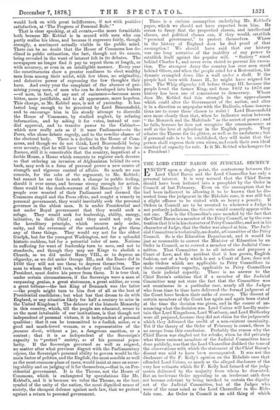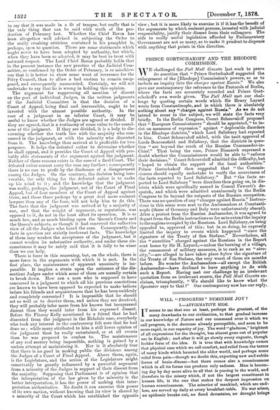THE LORD CHIEF BARON ON JUDICIAL SECRECY E XCEPT upon a
single point, the controversy between the Lord Chief Baron and the Lord Chancellor has only a personal interest. It is very natural that the Chief Baron should have been irritated into a pamphlet by the Order in Council of last February. Even on the assumption that he had been indiscreet in allowing it to be known that he dis- sented from the judgment in the Ridsdale case, it was still but a slight offence to be visited with so heavy a penalty. If Orders in Council are to be resorted to whenever a Judge is not perfectly judicious, the Gazette would scarcely appear with- out one. Nor is the Chancellor's case mended by the fact that the Chief Baron is a member of the Privy Council, or by the con- tention that it is in his character of Privy Councillor, and not in his character of Judge, that the Order was aimed at him. The Judi- cial Committee is technically, no doubt., a Committee of the Privy Council. So is the Education Department, and it would be just as reasonable to correct the Minister of Education by an Order in Council, as to correct a member of the Judicial Com- mittee. That Committee is to all intents and purposes a Court of Law, and the accident that it has grown, English fashion, out of a body which is not a Court of Law, does not make Orders which are applicable to Privy Councillors in their consultative capacity, applicable to Privy Councillors in their judicial capacity. There is no answer to the Chief Baron's criticism that if a member of the Judicial Committee may not state the fact that the Committee was not unanimous in a particular case, nearly all the Judges who from time to time have delivered the formal judgment of the Court have broken their oaths of secrecy. The dissent of certain members of the Court has again and again been stated at the time the decision was given, and in the course of an- nouncing what the decision was. Lord Cairns will hardly main- tain that Lord Kingsdown, Lord Westbury, and Lord Hatherley were all perjured, because they did not claim for the judgments which they delivered the credit of a non-existent unanimity. Yet if the theory of the Order of February is sound, there is no escape from this conclusion. Probably the reason why the Chief Baron was singled out for rebuke, when he did privately what these eminent members of the Judicial Committee have done publicly, was that the Lord Chancellor disliked the tone of the observations with which the statement of the Chief Baron's dissent was said to have been accompanied. It was not the disclosure of Sir F. Kelly's opinion on the Ridsdale case that offended Lord Cairns, so much as the alleged disclosure of the very low estimate which Sir F. Kelly had formed of the judg- ments delivered by the majority from whom he dissented. But an irrelevant Order appealing to an irrelevant oath does not become relevant by being invoked to sustain the dignity not of the Judicial Committee, but of the Judges who were of the same mind as the Lord Chancellor in the Rids- dale case. An Order in Council is an odd thing of which to say that it was made in a fit of temper, but really that is the only thing that can be said with truth of the pro- duction of February last. Whether the Chief Baron has been altogether well advised in subjecting the Order to the really crushing criticism contained in his pamphlet is, perhaps, open to question. There are some statements which ought never to have been adopted by authority, but which, when they have been so adopted, it may be best to treat with outward respect. The Lord Chief Baron probably holds that in the present instance the new practice of the Judicial Com- mittee, as confirmed by the Order of February, is so mischiev- ous that it is better to show some want of reverence for the Privy Council, than to allow a bad custom to remain unop- posed, and consequently unamended. Certainly, we will not undertake to say that he is wrong in holding this opinion. The argument for suppressing all mention of dissent on the part of individual Judges, in the written judgments of the Judicial Committee is that the decision of a Court of Appeal, being final and irreversible, ought to be invested with the utmost possible authority. In the case of a judgment in an inferior Court, it may be useful to know whether the Judges are agreed or divided. If they are agreed, that is a testimony of some value to the sound- ness of the judgment. If they are divided, it is a help to dis- covering whether the truth lies with the majority who con- curred in the judgment, or with the minority who dissented from it. The knowledge thus arrived at is profitable for two purposes. It helps the defeated suitor to determine whether he shall appeal, and it provides the Court of Appeal with pro- bably able statements of the argument against the judgment. Neither of these reasons exists in the case of a final Court. The defeated suitor cannot carry the case any further ; consequently there is no one to profit by the disclosure of a disagreement among the Judges. On the contrary, the decision being irre- vocable, the only thing for the defeated suitor is to make up his mind to it ; and the knowledge that the judgment was really, perhaps, the judgment, not of the Court of Final Appeal, but of four members of the Court of Appeal against three, and these three perhaps by a great deal more eminent lawyers than any of the four, will not help him to do this. The facts that the judgment was arrived at by a majority of one, and that the weight of argument, or reputation, was opposed to it, do not in the least affect its operation. It is as much law, and as much binding upon the Queen's Courts and the Queen's subjects, as though it had conveyed the collective view of all the Judges who heard the case. Consequently, the facts in question are strictly irrelevant facts. The knowledge of them may weaken the acceptance of the judgment, but it cannot weaken its substantive authority, and under these cir- cumstances it may be safely said that it is folly to be wiser than we can help.
There is force in this reasoning, but, on the whole, there is more force in the arguments with which it is met. In the first place, the maintenance of apparent unanimity is im- possible. It implies a strain upon the reticence of the dis- sentient Judges under which some of them are morally certain to break down. How can a man who is supposed to have concurred in a judgment to which all his previous convictions are known to have been opposed be expected to make believe before his friends and acquaintances that he has been suddenly and completely converted ? It is impossible that he should act so well as to -deceive them, and unless they are deceived, they will probably infer more from his known but inexpressed dissent than they would infer from his expressed dissent. Before Sir Fitzroy Kelly mentioned to a friend that he had dissented from the judgment in the Ridsdale case, everybody who took any interest in the controversy felt sure that he had done so ; while many attributed to him a still lower opinion of the judgment than he really entertained, or at all events than he was prepared to confess to. The maintenance of any real secrecy being impossible, nothing is gained by a useless attempt at maintaining it. Nor is it absolutely true that there is no good in making public the divisions among the Judges of a Court of Final Appeal. Above them, again, is the Legislature, and the action of the Legislature might conceivably be greatly influenced by a powerful argument from a minority of the Judges in support of their dissent from the majority. Supposing that Parliament is of opinion that the interpretation of the law given by the minority is the better interpretation, it has the power of making that inter- pretation authoritative. No doubt it can exercise this power of its own motion, without knowing that its view is shared by a minority of the Court which has established the opposite view ; but it is more likely to exercise it if it has the benefit of the arguments by which eminent persons, invested with judicial responsibility, justify their dissent from their colleagues. The aids to really useful legislation afforded by Parliamentary Government are not so many, as to make it prudent-to dispense with anything that points in this direction.







































 Previous page
Previous page